This book is a League of Fans project. League of Fans is a sports reform initiative founded by Ralph Nader to encourage civic responsibility in sports industry and culture.
Praise for How We Can Save Sports
Ken Reeds litany of problems and issues besetting American sportfrom grassroots to professional levelsis not new. What is new and worthy of a careful read are the authors compelling ideas on what individuals can do about them and why such actions are important. Those with power and a financial self-interest in sport will not be the engineers of reform. Rather, the only hope for a return to good sport will be the activism of those with a moral compass and love of sport who are willing to step forward in their own communities to make change happen one small action at a time. Donna Lopiano, president, Sports Management Resources; former CEO, Womens Sports Foundation
More than ever in this new gilded age of sports we need Ralph Naders cold, clear-shooting eye and a game plan for taking back the birthright of athletics. The League of Fans is our best hope. Robert Lipsyte, sports journalist, ESPN Ombudsman, and author of An Accidental Sportswriter
Ken Reeds book How We Can Save Sports is a reformers guide to cleaning up sports in America. His prescriptions are worth attention if America is to put sports competition back into perspective. The book takes on the tough questions surrounding the commercialization of sports in America and raises provocative questions about the proper role of sports in our society. C. Thomas McMillen, former U.S. congressman; college, NBA, and Olympic athlete
How We Can Save Sports is an ambitious book with thoughtful responses to virtually every ill facing sports in the United States. Ken Reed has written a valuable book that is both a challenge and a joy. A must read for anyone who cares about what sports could be. Jim Thompson, founder & CEO of Positive Coaching Alliance
We know that organized sport in America is out of control. Reeds concept of citizenship through sports activism is a much-needed clarion call for all of us to do something about it. More important, he provides a thorough action plan with specific strategies and actions that any citizen who cares deeply about the role of sport in our country can undertake. Its time for all of us to get in the sports reform game, and Reed has provided us with a game plan to do so. John R. Gerdy, author of Ball or Bands: Football vs. Music as an Educational and Community Investment
How We Can Save Sports is a must read for anyone who wants to right the ship we call SportsWorld, which has so many current crises. I want to share it with all my students in the DeVos Sport Business Management Program. Richard Lapchick, chair of DeVos Sport Business Management Program, University of Central Florida
According to Ken Reed, sport allows people of all ages to transcend their day-to-day lives in ways that enliven the human spirit. Reeds passionate love of sports informs every page of his book and explains the depth of his criticism of the commercial culture that is corrupting sport from the little league level to the pros. I have never read a book that better explains how commercialism, when out of control, diminishes the joy of sport for fans and participants alike. Allen Sack, University of New Haven, author of Counterfeit Amateurs ; played on Notre Dames 1966 national championship football team
The American sports institution and school-based physical education programs are in crisis. The rising tide of red ink burdening elite collegiate sports programs, the lockouts, strikes, and in some instances, the outright fiscal chaos stalking some professional franchises and leagues, are all hallmarks of current circumstances. Ralph Naders League of Fans project potentially focuses, escalates, and expands the dialog and debate concerning the core questions at issue here and holds the promise of bringing the broadest spectrum of sports stakeholders into the discussion. On these grounds alone, the League of Fans initiative is not only welcome and needed, it is a national service. Harry Edwards, professor emeritus, University of California, Berkeley
How We Can Save Sports
A Game Plan
Ken Reed
Foreword by Ralph Nader
ROWMAN & LITTLEFIELD
Lanham Boulder New York London
Published by Rowman & Littlefield
A wholly owned subsidiary of The Rowman & Littlefield Publishing Group, Inc.
4501 Forbes Boulevard, Suite 200, Lanham, Maryland 20706
www.rowman.com
Unit A, Whitacre Mews, 26-34 Stannary Street, London SE11 4AB
Copyright 2015 by Rowman & Littlefield
All rights reserved . No part of this book may be reproduced in any form or by any electronic or mechanical means, including information storage and retrieval systems, without written permission from the publisher, except by a reviewer who may quote passages in a review.
British Library Cataloguing in Publication Information Available
Library of Congress Cataloging-in-Publication Data Available
ISBN 978-1-4422-4264-7 (cloth : alk. paper)
ISBN 978-1-4422-4265-4 (electronic)
 The paper used in this publication meets the minimum requirements of American National Standard for Information SciencesPermanence of Paper for Printed Library Materials, ANSI/NISO Z39.48-1992.
The paper used in this publication meets the minimum requirements of American National Standard for Information SciencesPermanence of Paper for Printed Library Materials, ANSI/NISO Z39.48-1992.
Printed in the United States of America
To Ralph, the father of the modern consumer movement. Thanks for your belief in the sports project. You are the greatest advocate for the little guy of all time.
And to my wife Sandy and daughters Lexi and Angi. I love you three more than anything else in the world. You areand always will bethe first in first things first.
Foreword
I n every known society, no matter its size, anthropologists have found play as part of its social fiber. And a major form of playas a traditionhas been physical sport. Most sport in these early or simpler tribal societies was unorganized where the players outnumbered the spectators (apart from little children). Where sport was organized, as with the Olympics in ancient Athens, the spectators were more numerous than the athletes. But the spectators were allowed to watch for free.
Fast forward to twenty-first-century America. Organized sportsboth amateur and professionalhave evolved toward ever-superior performance records, rewards, and regalements. This has widened the gap between players and spectators so that the latter regularize themselves as watchers with extensive sports knowledge and a frequent propensity to let sedentary habits increase their weight. For those watchers who are fans in attendance at the arenas and stadiums, their enthusiasms come with stiff ticket, food, and parking prices.
Like most youngsters, I enjoyed sports of the intramural or the sandlot baseball game genre. Lou Gehrig was my hero. The superstar Yankee first basemans stamina, discipline, and dignitynarrated in books and movieswere inspirational. In those days, major league baseball was king. The NFL and the NBAs precursors were lesser diversions.
The succeeding decades witnessed a massive expansion of sports programming, including endless replaying on cable, and now on smartphones, with a correlative surge of commercialism above everything else. Professional sports are now available to watch 24/7. It is a very serious big business with sales and profits, salaries, corporate luxury suites, and political power burnishing the win-at-all-cost mentalities.
Submerged and subordinated beneath this frenetic rush for money and fame are the traditional physical, mental, and social values of sports for everyone to enjoy, including pursuing happiness and communing with family, neighbors, friends, and coworkers. Our countrys allocation of investment in sports entrenches this imbalance between spectator and participatory sports.
Next page
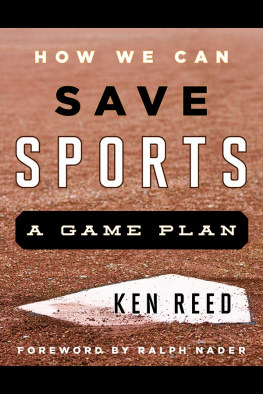

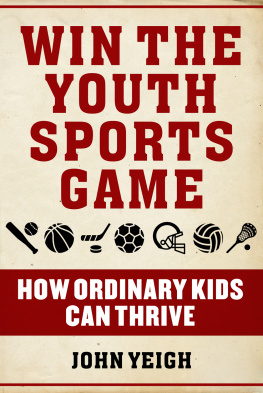


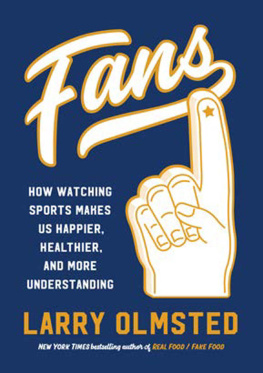
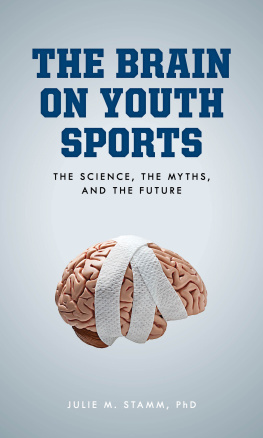
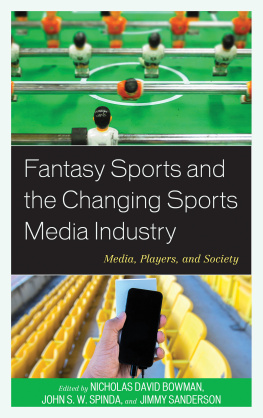
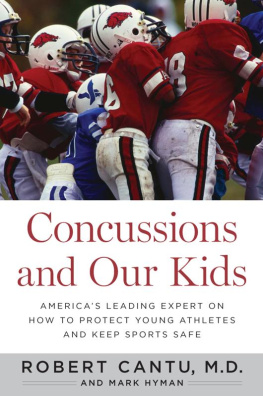
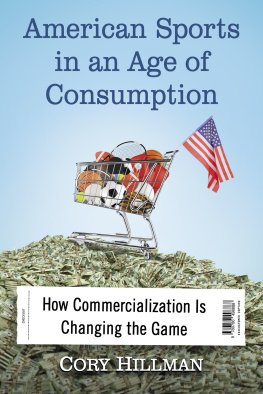

 The paper used in this publication meets the minimum requirements of American National Standard for Information SciencesPermanence of Paper for Printed Library Materials, ANSI/NISO Z39.48-1992.
The paper used in this publication meets the minimum requirements of American National Standard for Information SciencesPermanence of Paper for Printed Library Materials, ANSI/NISO Z39.48-1992.